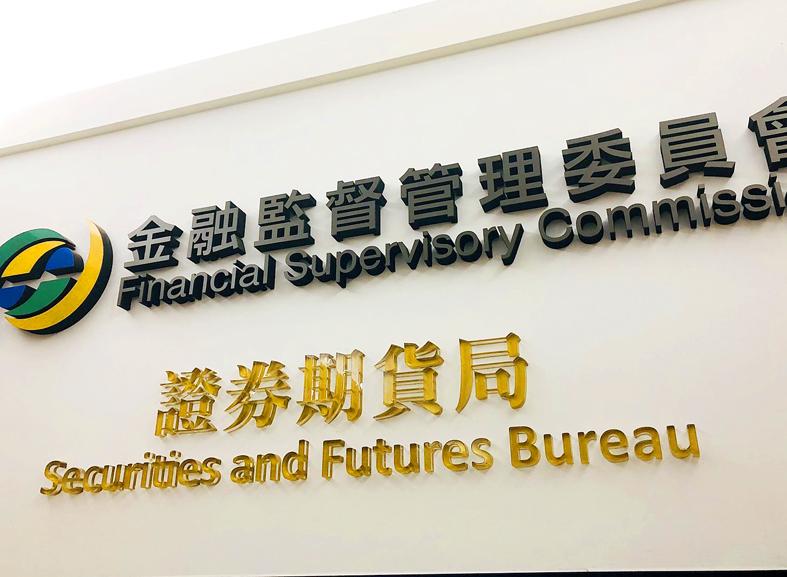The nation’s securities and futures companies must reveal cybersecurity incidents, consequent losses and countermeasures in annual reports from next year, given the rising frequency of cyberattacks in the past few years, the Financial Supervisory Commission (FSC) said on Tuesday.
Currently, securities and futures companies only need to report such incidents to the Taiwan Stock Exchange (TWSE) and the commission within 30 minutes after a hacking attack is detected.
To enhance information disclosure to investors, the commission said that companies need to reveal such incidents in annual reports as well.

Photo: Kelson Wang, Taipei Times
However, only incidents that cause serious losses would need to be disclosed, Securities and Futures Bureau Deputy Director-General Tsai Li-ling (蔡麗玲) said.
In addition to compensating investors affected by cyberattacks, securities firms must reveal how their financial results and operations were disrupted by the attacks, and specify what measures would be taken to lower such risks, Tsai said.
The commission did not say how many securities firms would need to disclose such information next year.
A TWSE official yesterday said by telephone that many securities firms had experienced more than one cybersecurity threat this year, “but not every threat caused great damage.”
Among 49 local securities companies that offer online trading, three firms, including Yuanta Securities Co (元大證券) and President Securities Corp (統一證券), last month were targeted by credential stuffing attacks in which clients’ trading accounts were used to buy Hong Kong stocks, even though the clients did not place such orders.
The commission has fined some securities companies for failing to install firewalls or improve cybersecurity loopholes, and for allowing external technology suppliers to manage servers remotely.
In related news, the commission would implement 15 new policies next year, including two that are intended to help consumers affected by the COVID-19 pandemic.
The commission has asked banks to extend the grace period of loan payments by up to six months for those struggling to repay debt, and allow consumers to take out loans against their life insurance policies, it said.
Other policies include improving banks’ controls on their sales agents given rising instances of malpractice, and encouraging financial institutions to disclose climate change and information security risks.

UNCERTAINTY: Innolux activated a stringent supply chain management mechanism, as it did during the COVID-19 pandemic, to ensure optimal inventory levels for customers Flat-panel display makers AUO Corp (友達) and Innolux Corp (群創) yesterday said that about 12 to 20 percent of their display business is at risk of potential US tariffs and that they would relocate production or shipment destinations to mitigate the levies’ effects. US tariffs would have a direct impact of US$200 million on AUO’s revenue, company chairman Paul Peng (彭雙浪) told reporters on the sidelines of the Touch Taiwan trade show in Taipei yesterday. That would make up about 12 percent of the company’s overall revenue. To cope with the tariff uncertainty, AUO plans to allocate its production to manufacturing facilities in

TAKING STOCK: A Taiwanese cookware firm in Vietnam urged customers to assess inventory or place orders early so shipments can reach the US while tariffs are paused Taiwanese businesses in Vietnam are exploring alternatives after the White House imposed a 46 percent import duty on Vietnamese goods, following US President Donald Trump’s announcement of “reciprocal” tariffs on the US’ trading partners. Lo Shih-liang (羅世良), chairman of Brico Industry Co (裕茂工業), a Taiwanese company that manufactures cast iron cookware and stove components in Vietnam, said that more than 40 percent of his business was tied to the US market, describing the constant US policy shifts as an emotional roller coaster. “I work during the day and stay up all night watching the news. I’ve been following US news until 3am

COLLABORATION: Given Taiwan’s key position in global supply chains, the US firm is discussing strategies with local partners and clients to deal with global uncertainties Advanced Micro Devices Inc (AMD) yesterday said it is meeting with local ecosystem partners, including Taiwan Semiconductor Manufacturing Co (TSMC, 台積電), to discuss strategies, including long-term manufacturing, to navigate uncertainties such as US tariffs, as Taiwan occupies an important position in global supply chains. AMD chief executive officer Lisa Su (蘇姿丰) told reporters that Taiwan is an important part of the chip designer’s ecosystem and she is discussing with partners and customers in Taiwan to forge strong collaborations on different areas during this critical period. AMD has just become the first artificial-intelligence (AI) server chip customer of TSMC to utilize its advanced

Six years ago, LVMH’s billionaire CEO Bernard Arnault and US President Donald Trump cut the blue ribbon on a factory in rural Texas that would make designer handbags for Louis Vuitton, one of the world’s best-known luxury brands. However, since the high-profile opening, the factory has faced a host of problems limiting production, 11 former Louis Vuitton employees said. The site has consistently ranked among the worst-performing for Louis Vuitton globally, “significantly” underperforming other facilities, said three former Louis Vuitton workers and a senior industry source, who cited internal rankings shared with staff. The plant’s problems — which have not